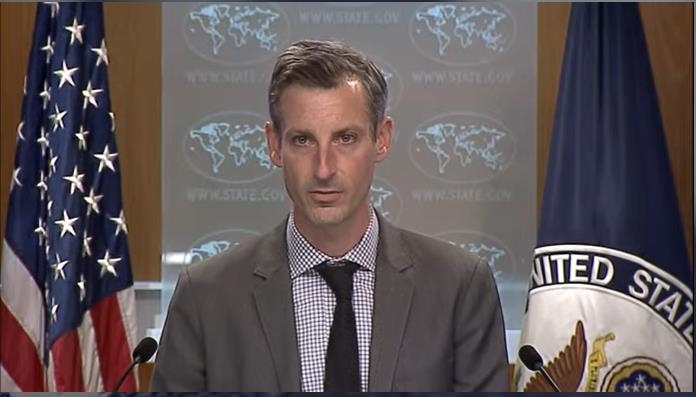 |
State Department Press Secretary Ned Price is seen speaking in a press briefing at the department in Washington on Monday in this image captured from the department's website. (Yonhap) |
WASHINGTON -- Trilateral cooperation between South Korea, Japan and the United States is one of the most important and effective tools to denuclearize the Korean Peninsula, State Department Press Secretary Ned Price said Monday.
He made the remarks as Secretary of State Antony Blinken is set to hold a trilateral meeting with his South Korean and Japanese counterparts later this week.
"I can be confident that one of the priority issues of discussion in that setting will be the recent provocations we have seen from the DPRK including its missile launches," the spokesperson said of Blinken's upcoming talks with South Korean Foreign Minister Chung Eui-yong and Japanese Foreign Minister Yoshimasa Hayashi, which will be held in Hawaii on Saturday.
DPRK stands for the Democratic People's Republic of Korea, the North's official name.
Price said to achieve any progress toward the complete denuclearization of the Korean Peninsula, "one of the indispensable ingredients is close coordination with our allies and partners, and then Japan and ROK are, of course, two of our allies who we can we work with most closely on this challenge," referring to South Korea by its official name, the Republic of Korea.
"We know that bilateral coordination is important, but we also know that trilateral coordination between the United States Japan and the ROK really is and will be indispensable if we are to achieve progress," he added.
The upcoming three-way foreign ministerial follows a recent series of North Korean missile tests.
Pyongyang staged seven rounds of missile launches in January, the largest number of missile tests conducted by the impoverished North in a single month.
It also fired an intermediate-range ballistic missile on Jan. 30 (Seoul time), its longest-range missile launched since late 2017.
Price insisted the North alone was to blame for its recent missile provocations.
"If you want to assign responsibility for the DPRK's provocations or the potential threats to international peace and security we've seen emanate from the DPRK, the only party that deserves blame, the only party that can be assigned culpability is the DPRK," he said.
China's representative to the United Nations last week suggested the US may be partly responsible for the North's missile launches by failing to take a more flexible stance toward the North.
The state department spokesperson reiterated the US' commitment to diplomacy.
"We have made very clear that we have no hostile intent towards the DPRK. We have made very clear that we wish to engage in dialogue and diplomacy. We have made very clear that we believe that only through dialogue and diplomacy can we most effectively achieve what again is our overriding policy objective and that's the complete denuclearization of the Korean Peninsula," said he.
North Korea has stayed away from denuclearization talks since late 2019. It is also ignoring all US overtures made since Joe Biden took office in January 2021.
"The ultimate tool is diplomacy," Price said when asked what options the US had to prevent North Korea from staging further provocations.
"We have not yet found a willing partner in Pyongyang to engage in that dialogue. But we have continued, even in the absence of substantive engagement from the DPRK, to coordinate closely with Japan, with the ROK, other allies and partners in the Indo Pacific, but also allies and partners around the world," he added. (Yonhap)








